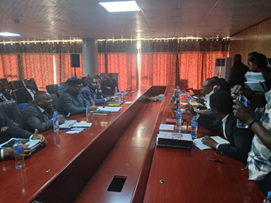By Abdul Rahman Bah
During the oversight committee meeting of the Foreign Affairs Ministry on Monday, February 3, 2025, at Committee Room 1 of the Parliament Building in Freetown, the Minister of Foreign Affairs and International Cooperation, Timothy Kabba, provided a comprehensive update on the longstanding border dispute between Sierra Leone and Guinea, particularly concerning the Yenga territory.
The minister began by recounting the historical context of the dispute, noting that after the end of the civil conflict in 2002, Sierra Leone maintained a military presence on the first floor of the contested area. Records indicate that after the war, the heads of state of both Sierra Leone and Guinea met at the Makona River and agreed on certain territorial principles. According to these records, it was determined that land beyond the river would be considered a boundary limit. However, the situation began to deteriorate over time. Kabba explained that sometime around the end of 2003 or possibly last year, the government became aware that Guinean armed forces had constructed a small military camp near the town of Yenga. This development raised serious concerns and prompted further tensions.
The minister recalled that when this military activity was first reported, a delegation was dispatched by the government to assess the situation in Yenga in 2003. Kabba himself visited the area and engaged with the battalion commander in charge of the Guinean forces stationed there. During his visit, he interrogated the commander, questioning the rationale behind the establishment of a military camp in Sierra Leonean territory. According to the commander, the order to occupy the area and establish a camp had come from his superior officers. Despite efforts by the government to address the issue diplomatically, there had been little progress in resolving the matter.
Kabba further revealed that before his visit to Yenga, President Julius Maada Bio, as the chief diplomat of Sierra Leone, had made significant efforts to engage Guinea through diplomatic channels. This included appointing envoys to initiate dialogue with Guinean authorities. However, despite these high-level engagements, the desired outcome—the withdrawal of Guinean troops from Yenga—had not been achieved. The continued military presence of Guinean forces in Sierra Leone’s territory remained a major concern.
The situation escalated further in 2023, when a mast was erected in the heart of Yenga with an inscription that read “1886,” suggesting that the border between Guinea and Sierra Leone was originally established at that time. The minister explained that this date predates the Berlin Conference of 1884–1885, which was instrumental in determining colonial-era boundaries across Africa. The presence of this inscription raised questions about historical claims to the land and further complicated the dispute.
Despite multiple diplomatic efforts to resolve the issue amicably, Sierra Leone has faced challenges in seeking an international platform to formally lodge a complaint against Guinea. However, the recent ratification of the Niamey Convention on cross-border issues by the Sierra Leonean Parliament has provided a new avenue for addressing the matter. Kabba expressed gratitude to Parliament for ratifying the convention, which now enables Sierra Leone to seek arbitration through the African Union. He emphasized that this regional framework could serve as a formal multilateral space for addressing the territorial dispute and ensuring that Sierra Leone’s claims receive international recognition.
While diplomatic efforts are still ongoing, Kabba acknowledged the frustration and anxiety among the people living in Yenga and surrounding areas. He noted that the presence of foreign troops in their territory has left residents in a state of fear and uncertainty. The government remains committed to resolving the matter peacefully, but recognizes the complexity of dealing with a military-led government in Guinea, which presents additional diplomatic hurdles.
The minister reassured the oversight committee that since being invited to brief Parliament on the issue, the government has reactivated discussions on the matter. He highlighted the existence of an inter-ministerial committee tasked with handling the Yenga dispute. This committee includes representatives from the Ministry of Local Government, the Ministry of Defense, the Ministry of Foreign Affairs, the Ministry of Development, and the Office of National Security (ONS). Although the committee had been relatively inactive, the government is now working to reinvigorate its efforts to find a lasting solution.
One of the key challenges in engaging with the Guinean authorities has been the lack of a clear diplomatic pathway for negotiation. As a civilian government, Sierra Leone is bound by international diplomatic protocols and mandates, making it difficult to directly engage with Guinea’s military-led administration on this issue. However, President Bio continues to engage with the highest levels of Guinean leadership, as well as at the second-tier diplomatic level, to push for a resolution.


Kabba reiterated that the government remains fully committed to ensuring the security of its borders and the protection of its citizens. He highlighted that ongoing discussions with Guinea are also addressing broader issues, including border security, economic cooperation, and the fight against human trafficking and terrorism.
In conclusion, he reassured the committee that diplomatic efforts are being pursued relentlessly and that the government will do everything within its power to secure a peaceful resolution to the Yenga dispute. He invited members of the committee to pose any questions before he proceeded to another engagement.